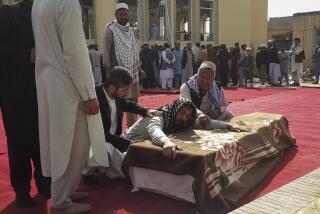Afghan president pledges to support U.S. war plan
- Share via
Reporting from Kabul, Afghanistan — President Hamid Karzai on Wednesday pledged to “spare no effort” to help implement the revamped American war strategy, the latest test for an Afghan leader struggling to shake off the effects of a fraud-tainted election and counter widespread disillusionment among his own people.
But Karzai did not directly respond to the latest U.S. demands that he root out corruption in his government.
The Taliban, meanwhile, scoffed at the notion that the American troop increase announced Tuesday by President Obama, coupled with an intensive effort to train and build up the Afghan army and police, would pose a serious challenge to the insurgency.
“Training Afghan forces is useless, because the Afghan nation looks at them as invaders,” said a statement posted on a Taliban website and distributed to Western journalists. “As much as the international community increases its forces, the holy warriors have become even more powerful, winning the support of the nation in their resistance.”
Some senior officials in Karzai’s government expressed doubts about whether the Afghan army and police could be adequately strengthened in time to accommodate a drawdown of foreign troops beginning in July 2011, the goal set by Obama.
“In 18 months we will not be able to grow [the security forces] as much as required given the security needs of the country,” said Interior Minister Mohamad Hanif Atmar, who met with the top American commander, Army Gen. Stanley A. McChrystal, shortly after Obama delivered his address to the American people.
However, Atmar and other Afghan officials expressed hope that the timetable laid out by the U.S. administration would help provide momentum for building up Afghanistan’s police and army, and noted Obama’s assurances that the American drawdown would be a phased one, tied to conditions on the ground.
McChrystal also met Wednesday with Karzai and described him as “very upbeat, very resolute” about implementing the Obama plan.
But Karzai was largely silent in response to Obama’s crisp demand for reforms in the Afghan government, a refrain that has been sounded repeatedly by senior U.S. officials, including Secretary of State Hillary Rodham Clinton, who traveled to Afghanistan last month for Karzai’s inauguration to a second term.
In a statement issued 12 hours after Obama’s speech, the presidential palace said the Karzai administration would work toward “strengthening of the Afghan government in law enforcement” but said nothing else about promised efforts to crack down on graft and bribery.
Corruption has been a highly charged issue between Karzai’s administration and the West. The Afghan president is expected to name his Cabinet in the next 10 days. Western officials have said the lineup of ministers will give an indication as to whether Karzai is ready to withhold key posts from those implicated in past wrongdoing.
Some Karzai critics said the West’s leverage in forcing government reforms was limited.
“Obama doesn’t trust this administration, but there is nobody to replace Karzai, so the U.S. has no choice but to support him,” said Haji Salim Wardak, a member of the provincial council in Helmand province, one of the main centers of the insurgency.
Despite qualms over the integrity of their own government, many Afghans expressed relief over Obama’s commitment to send 30,000 more American soldiers, saying the country is under serious threat from the insurgency.
“Sending more troops is a good idea because they have to help curb Al Qaeda and the Taliban,” said Kabul businessman Abdul Kafil. “Otherwise they will recapture the country.”
Wednesday brought a reminder of the costs of the escalating military effort. Officials disclosed the death, a day earlier, of an American soldier in Afghanistan’s volatile east, bordering Pakistan.
McChrystal, who briefed his commanders shortly after Obama’s speech, acknowledged the sacrifices that lay ahead.
“There are going to be more long nights, more cold days, more memorial services, more frustrations, more questions,” the general said. “But there are also going to be more Afghans with a chance.”
More to Read
Sign up for Essential California
The most important California stories and recommendations in your inbox every morning.
You may occasionally receive promotional content from the Los Angeles Times.













